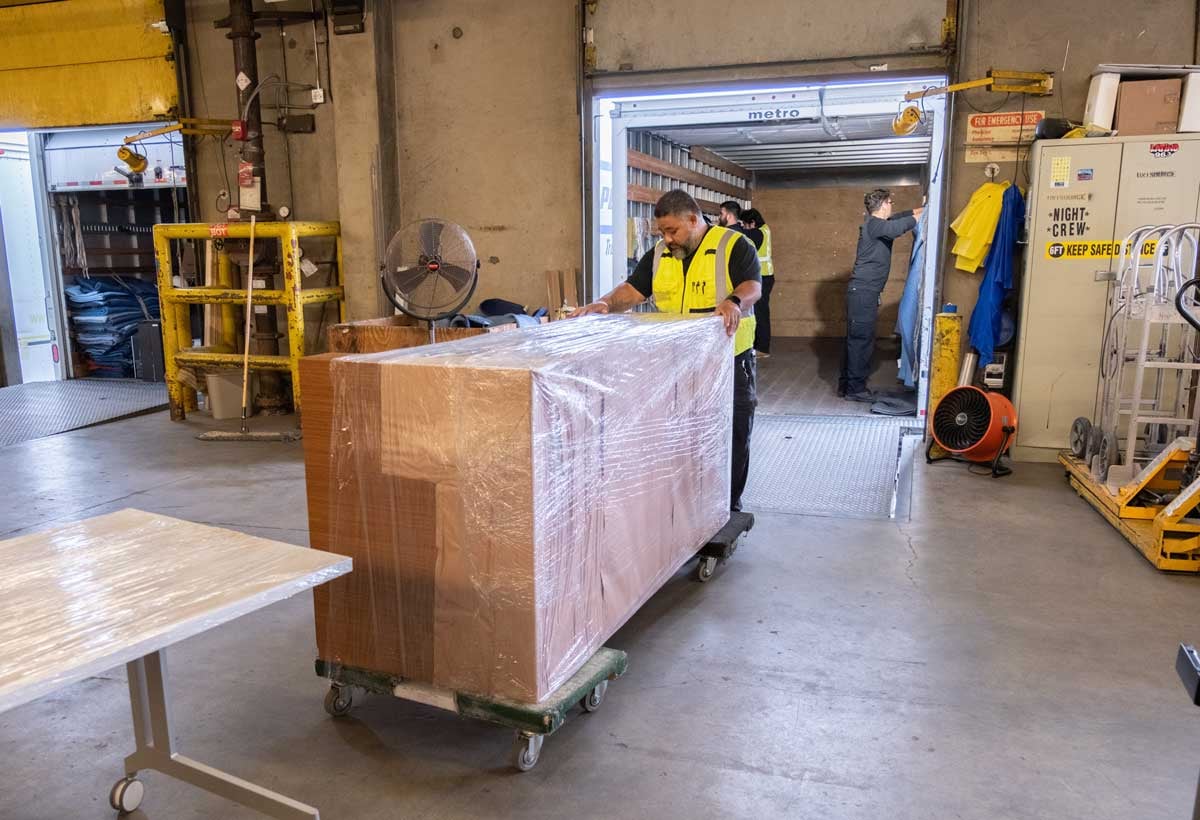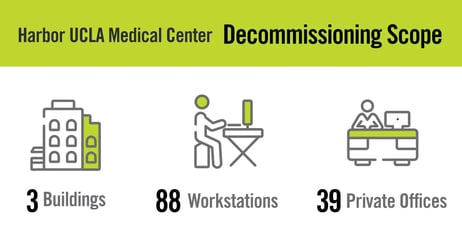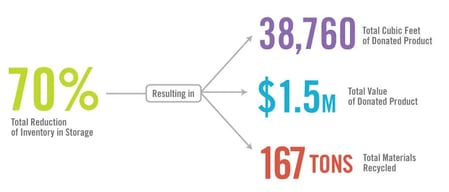Sustainability has become a significant operational imperative for most companies. Office decommissioning, the process of reconfiguring offices to a smaller footprint, reducing square footage in general, or shutting down space entirely, offers a prime opportunity to embody sustainability principles.
The practice of reuse, recycle, and repurpose stands as a testament to an organization's commitment to sustainability, marrying environmental stewardship with economic savvy. Adopting sustainable office decommissioning practices minimizes waste, mitigates environmental impact, and unveils substantial economic benefits through cost savings and potential revenue from salvaged materials.
Here we unveil the importance of integrating sustainability into the fabric of office decommissioning, exploring how organizations can transform this necessary business operation into a powerful tool for environmental conservation and economic efficiency.
Understanding Office Decommission
Office decommissioning involves the systematic dismantling or reconfiguring of office spaces, which may include the removal of fixtures, furniture, and equipment, alongside the termination of services and utilities. The key components of this process include asset liquidation, waste management, space restoration, and, crucially, strategic planning to ensure minimal environmental impact. Incorporating sustainability into this equation means prioritizing actions that extend the lifecycle of assets through resale, donation, or recycling, rather than defaulting to landfill disposal.
This approach not only underscores an organization's dedication to environmental stewardship but also leverages economic benefits by reducing disposal costs and potentially generating revenue through the sale of assets. Thus, making sustainability a priority in office decommissioning is not just an ethical choice but a strategic business decision that aligns with the global shift towards more responsible consumption and production practices.

Planning for Sustainability
Early planning is crucial for successful decommissioning. It paves the way for an integrated approach that aligns with sustainability goals. Starting with a focus on sustainability helps companies assess environmental, economic, and social impacts upfront. This foresight enables identifying opportunities for material reuse, recycling, and repurposing, reducing the ecological footprint.
Establishing clear, measurable goals and objectives is critical in this phase—objectives such as achieving a specific percentage of waste diversion from landfills, or targeting a certain amount of assets for donation or resale. By setting these benchmarks early, businesses can craft a strategic plan that prioritizes sustainable practices throughout the decommissioning process, ensuring that every decision supports the company's commitment to environmental stewardship and social responsibility.
Inventory and Analysis
Conducting a thorough inventory of office assets is essential for identifying items that can be reused, repurposed, or recycled. This exhaustive list should cover everything from furniture and electronics to smaller office supplies. Detailed inventorying aids in streamlining the decommissioning process, enabling organizations to efficiently allocate resources towards the sustainable management of these assets, ultimately reducing waste and capitalizing on opportunities to support environmental sustainability.
A thorough assessment of office assets is crucial to determine their potential for reuse, resale, or recycling. This evaluation considers the physical state and market demand to avoid wasting resources on repurposing or selling items with little or no value. A knowledgeable evaluation maximizes environmental benefits and economic return by directing assets to their most suitable afterlife.
Sustainable Disposal Methods
Partnering with charitable organizations for asset donation is an excellent way to support community initiatives while also promoting sustainability. Organizations can donate items such as furniture and office supplies to local schools or non-profits, giving them
Unisource Solutions offers comprehensive storage and repair services for office assets, ensuring they are maintained in optimal condition for future use. This not only prolongs the life of the assets but also supports sustainability by minimizing the need for new resources.
We work with certified recycling partners who adhere to relevant environmental regulations and standards. These partners specialize in processing and recycling various types of assets, including electronics, furniture, metals, and plastics. Choosing certified vendors ensures proper disposal while minimizing environmental impact.
Partnering with certified e-waste recyclers is vital for the responsible disposal of electronic assets, ensuring that hazardous materials are handled according to environmental standards. This not only mitigates potential harm to the ecosystem but also aligns with regulatory compliance, safeguarding your organization against legal ramifications and fostering a reputation for responsible corporate citizenship.
Key Case Studies
Harbor–UCLA Medical Center
Tasked with decommissioning 3 buildings, and restacking 88 workstations and 39 private offices, we were challenged to come up with a strategic plan to re-use the Center’s existing furniture systems.
View the Harbor-UCLA Medical Center case study »
Union Bank
Union Bank had a need, like many others, to consolidate a sprawling array of space. This included the company’s entire Los Angeles headquarters – eight floors in total – San Diego, New York, and Santa Barbara.
View the Union Bank case study »
AT&T
AT&T tapped Unisource Solutions to decommission one of their El Segundo-leased buildings and re-stack their adjacent leased facilities at the campus. We were tasked to decommission eight floors, spanning almost 205,000 square feet, and accounting for more than 1,300 units of office and systems furniture.
View the Union Bank case study »
Engaging Stakeholders
Involving employees and other stakeholders in sustainability efforts is critical for fostering a culture of environmental responsibility that extends beyond the corporate sphere into personal value systems. Initiating a comprehensive awareness campaign within the organization, pinpointing the significance and benefits of sustainable practices, can significantly enhance engagement. Empowering employees through workshops, trainings, and participation in decision-making processes regarding sustainable initiatives not only enhances their understanding but also instills a sense of ownership and commitment towards these practices.
Cultivating an environment where feedback and innovative ideas for sustainability are encouraged and recognized further amplifies this effect. Additionally, engaging stakeholders through regular updates and involving them in sustainability discussions ensures a broader impact, making sustainability a shared goal rather than a corporate mandate. This collective approach not only amplifies the reach of sustainability efforts but also integrates them into the fabric of the organization’s culture, driving meaningful and lasting change.
Conclusion
In the evolving landscape of corporate responsibility, sustainability in office decommissioning emerges not just as a preference, but as a necessity. The strategies outlined here, from early planning and thorough asset inventory to sustainable disposal methods and active stakeholder engagement, underscore the significant role that sustainability plays in modern decommissioning projects.
The economic, environmental, and social benefits derived from such practices are undeniable, showcasing that ethical environmental stewardship can simultaneously align with strategic business outcomes.
Schedule Your Office Decommissioning Consultation Today
Discover how your business can lead in sustainability and efficiency; contact us now to book your office decommissioning consultation.









